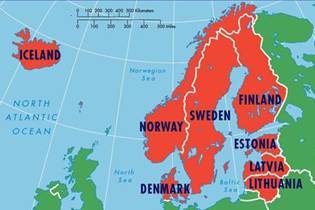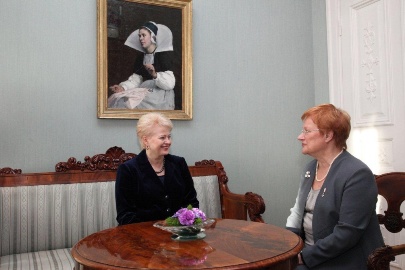
THE VOICE OF INTERNATIONAL LITHUANIA
|
VilNews has its own Google archive! Type a word in the above search box to find any article.
You can also follow us on Facebook. We have two different pages. Click to open and join.
|


By Dr. Stasys Backaitis
 Conference on U.S.-Nordic-Baltic Cooperation:
Conference on U.S.-Nordic-Baltic Cooperation:Shaping the U.S.-European Agenda
The conference provided an overview by U.S. and European researchers and political experts on the importance, need and benefits of a close U.S. collaboration with the Nordic-Baltic region. The collaboration would facilitate building a wider and more secure Europe, reinforcing U.S. attention to transatlantic engagement, and achieving a more constructive dialog with Russia leading to democratization of its society. The conference took place on Friday, May 4, 2012, at The Paul H. Nitze School of Advanced International Studies of the John Hopkins University, Washington, D.C.
The agenda included:
|
Opening remarks. Kurt Volker, Senior Fellow, Center for Transatlantic Relations |
|
|
|
|
|
Panel Discussion |
|
|
|
|
|
Panel Discussion |
|
|
Panel Discussion |
|
|
Concluding Remarks Reception at the Lithuanian Embassy and Remarks by James Townsend, Deputy Assistant Secretary of Defense for European and NATO Policy |
This summary does not intend to deal with every specific issue addressed in this conference. Since many of the issues covered by the speakers and discussers overlapped, it would be of little value to repeat them in this summary on an author to author basis. Rather, the summary is intended to highlight the issues raised and provide the readers the general direction of the topics presented. Details of the issues addressed may be found in the Center for Transatlantic Relations publication entitled “Nordic-Baltic-American Cooperation: Shaping the U.S.-European Agenda”, John Hopkins University, Paul H. Nitze School of Advanced International Studies, May 4, 2012, Kurt Volker and Ieva Kupce, Editors.
Need for more attention towards the relationship between the United States (U.S.) and the democracies of the Nordic- Baltic Region (NB8)
The conference highlighted the need for more attention towards the relationship between the United States (U.S.) and the democracies of the Nordic- Baltic Region. Encompassing Denmark, Estonia, Finland, Iceland, Latvia, Lithuania, Norway and Sweden, the Nordic-Baltic countries (NB8) are remarkable for their economic health, their promotion of democracy, respect for human rights and the rule of law, their contribution to international security and peacekeeping operations beyond their borders, in spite of the on-going economic crisis in the EU. The values and the vision of the NB8 countries to strive and promote these policies make them valuable allies to the United States. In spite of a changing globalized world and shifting power centers, a strong transatlantic link remains indispensable for enhancing common principles and values within the Euro-Atlantic area in general, and particularly valuable and example setting between the U.S. and the NB8.
While there is some disappointment in the U.S. over Europe’s difficulties to cope effectively with the economic crisis and being an effective security partner, the NB8 nations stand out uniquely as a stable, responsible and dynamic region of Europe. The region also shows that democracy still works, that a positive onward vision of the free world is possible, and that there are still important challenges ahead for the transatlantic institutions. The conference explored how the NB8 region and the U.S. can be engaged in and cooperate to shape the broader transatlantic agenda in a positive direction.
The topics in the conference explored the vision the Nordic Baltic countries together with the U.S. might bring to the table and cooperate to shape the broader transatlantic agenda for common good and security. The conference organizers noted that concrete contributions as a result of such cooperation, in line with the EU and the NATO agendas, can be made in a number of areas such as:
- Continue to promote a Europe whole, free and at peace,
- Help aspiring European nations to join the NATO and EU
- Regional integration to attain higher levels of security than could be possible as a disparate collection of individual states and policies
- The relationship with Russia
- Energy and Cyber security
- U.S engagement with Europe
NB8 region has found ways to produce unprecedented security and stability
At a time when a larger part of the Euro-Atlantic community struggles to determine how it should address and resolve its financial and political difficulties, the NB8 region has found ways to produce unprecedented security and stability. Unlike their older EU counterparts, the Nordic and the Baltic countries have shown willingness to reform, to cooperate and to integrate where necessary. Their example of addressing together the arising challenges is a good example to the rest of the EU members on how to solve their current difficulties, leading to a Europe that is whole, free and at peace. .
The Baltic states, Norway and Finland, bordering Russia, have a direct interest and valuable perspective on living with Russia as a neighbor and managing with it security, energy and environmental issues. This provides them a better in-depth understanding and ability to interpret linkages between Russia’s authoritarian system and its external behavior. The NB8 states cannot change Russia on their own, but they can contribute to better formulated and more coherent EU, NATO and U.S. policies toward Russia.
The Baltic states, being particularly energy resources poor, stand out as models for handling complicated and intertwined energy issues with Russia while also reducing their dependency on Russia’s supplies. There is a concerted effort by all NB8 states to move towards integrated energy security by interconnecting their energy generating systems, cooperation in the development of alternative resources, and the construction of a common regional energy market. The region’s move towards greater energy security and sustainability is a good policy model to both the EU and NATO.
In view of the new U.S. Defense Policy Guidance of January 2012, in which the U.S. intends to reduce its military presence in Europe, Washington promised as compensation rotation of U.S. based brigade size forces to Europe to participate in multinational and NATO led training and military exercises. These rotations should be structured to maximize U.S-Nordic-Baltic military engagements including the use of training facilities on both sides of the Atlantic. By the use of trips across the Atlantic, the Nordic-Baltics would leverage state of the art training facilities in the United States and Canada and would enhance their readiness to undertake expeditionary operations throughout the entire NATO nordic region. Active and increasing participation by NB8 in various NATO training operations both at combat and command as well as planning levels, offer to the U.S a value model on the need to sustain a strong transatlantic engagement.
While there can be no security guarantee to the NB8 region without the U.S., there is also no sustainability of a U.S. role in the NorthAtlantic-Baltic and Central European regions without participation and contribution by the Nordic-Baltic countries. The United States needs Europe and thereby NATO, as much as Europe needs the United States as well as NATO. Transatlantic solidarity is essential to support and promote global trade, economic development, security and stability in an increasingly unpredictable world. The interdependence is best reflected in common political objectives, such as to assure a level playing field through unique transatlantic solidarity embodied by NATO. The Alliance’s new focus on partnerships at the Chicago NATO summit is in recognition of global security interdependence.
NATO and EU seem to share similar objectives in energy diversification of supplies, working toward creation of identical infrastructures and interconnectivity, response to emergencies, assistance to third countries , etc. Shale gas has been and will be a game changer in the foreseeable future. It is breaking Russia’s stranglehold on supplies to Europe. Furthermore, the developing interconnectivity of gas and electricity resources and competition in the energy market within the Nordic–Baltic region is diminishing GAZPROM’s power of monopoly. Focusing on diversification of supplies, attaining diminished vulnerability, and building a permanent framework for reduction of short and long term energy security risks are activities bringing greatest added value to energy security. This will be beneficial for both the EU and NATO, because it will make them much stronger in dealing with possible future energy crisis, and projecting stability and sustainability in their respective areas of operation. Effective NB8 cooperation supported by U.S. in the establishment of NATO Energy Security Center of Excellence in Lithuania represents a window of opportunity for attaining these goals.
NB8 countries are leaders in promoting democracy, rule of law, human rights and market based development
The Nordic-Baltic region offers many assets to the transatlantic community. They are leaders in promoting democracy, rule of law, human rights and market based development in Europe and around the world. They are also regarded as honest brokers in many hotspots of the globe. U.S.-Nordic-Baltic cooperation can serve as an important new and stable pillar to the transatlantic community. The shared vision, values, capabilities and collaboration that define the Nordic-Baltics, can be used to reanimate the effort to build a wider and more secure Europe, transatlantic stability, and help to achieve constructive dialog and cooperation with Russia. Such collaboration can also reinforce U.S. commitments to Europe’s regional security requirements and simultaneously drive forward the transatlantic community’s effort to address developing global challenges
During subsequent discussions several comments were made on the futility of the U.S. and EU to accommodate Russia’s adversarial political positions, and continuing human rights and rule of law violations. It was suggested that the West should take a strong and critical stand on these abuses with the Russian government while encouraging and facilitating developments of respect for human rights, rule of law and governance by the people through democratic institutions. While some comments indicated that the U.S. and EU currently are not in a good position to challenge Russia because of critical access to Afghanistan, others noted that Russia needs NATO presence in Afghanistan as means to reduce its vulnerability to Muslim extremism. In this regard the United States and the Nordic-Baltics should leverage their capacities and experience in a way to deepen their engagement with the Russian people and the state. Shared concerns in the Baltic Sea region such as environment protection, maritime safety, land and air transportation, could serve as platforms of common interest. Properly constructed, U.S.and NB8 cooperation could become a positive reinforcement of the insecurities encountered in the EU-U.S. transatlantic partnership. U.S.-Nordic–Baltic cooperation will also be a positive inducement to the U.S. to reinforce its commitment to maintain strong transatlantic ties as means of maintaining stability in the adjoining part of the world with minimal expense and effort.
Stan Backaitis
05/25/12
United Nordic-Baltic region will ensure economic stability and energy security

Saturday, October 29, Helsinki - President Dalia Grybauskaitė, currently on a working visit in Helsinki, met with the President of Finland, Tarja Halonen, to discuss Nordic-Baltic cooperation issues, Press Service of the President reports.
This year Finland coordinates the Nordic-Baltic Eight (NB8) cooperation with Lithuania taking over these duties next year. Lithuania and the other Baltic and Nordic countries cooperate actively in advocating the interests of the region in the EU, NATO, OSCE, and other international organizations.
“Joint efforts to strengthen the security of the region’s borders, ensure its economic stability and energy security will help create general well-being and advance progress in the Baltic-Nordic area,” the President said.
The President noted that the deepening of security cooperation was among next year’s top priorities, including border control of the Nordic and Baltic countries, closer interaction on the Baltic Sea environmental issues as well as in cyber and energy security, using to the full extent the possibilities offered by the Vilnius-based Energy Security Center.
The President underlined that the Nordic-Baltic region – one of the most rapidly developing regions in the European Union – was a dynamic driving force to advance economic stability, growth, responsible fiscal policies, innovations, and progress.
The Nordic Baltic region aspires to be among the first to put a single information space and digital market in place for accelerating electronic settlements, information exchange and access to information.
The presidents of Lithuania and Finland emphasized that keeping the Baltic Sea clean and secure for the future generations was a key commitment for all the Baltic Sea rim countries. Specific measures binding for all the nations around the Baltic Sea were set forth at the Baltic Sea Action summit held in Helsinki last year.
Tagged as: Dalia Grybauskaitė, Nordic-Baltic cooperation, Tarja Halonen
JAV-Šiaurės-Baltijos valstybių bendradarbiavimas formuojant JAV-Europos kooperavimo darbotvarkę
Dr. Stasys Backaitis, P.E., SAE Fellow
- Bookmark :
- Digg
- del.icio.us
- Stumbleupon
- Redit it
VilNews e-magazine is published in Vilnius, Lithuania. Editor-in-Chief: Mr. Aage Myhre. Inquires to the editors: editor@VilNews.com.
Code of Ethics: See Section 2 – about VilNews. VilNews is not responsible for content on external links/web pages.
HOW TO ADVERTISE IN VILNEWS.
All content is copyrighted © 2011. UAB ‘VilNews’.

 Click on the buttons to open and read each of VilNews' 18 sub-sections
Click on the buttons to open and read each of VilNews' 18 sub-sections 



This is impressive and also great information, This is excellent. best battery powered leaf blower
Nice information to share with us!
Superb! Wow, such an interesting topic to read!
Nice info admin. I'd like to know more about the topic.
Thank you so much for this informative articles, I hope you could keep up the good work. I would like you to visit this site that has a huge collection of related information.
Wow, superb from you! Glad that i found your site today. I'll bookmark your website and come back soon. Btw, how do i get more information about this? vien danke!
how do i get more details about this?
I wonder how can write a good Jasa Floor Hardener article like this.
How Rusian's response with its cooperation?
get Commercial Solar Carports in San Diego by xsunx one of the best solar companies in orange county ca